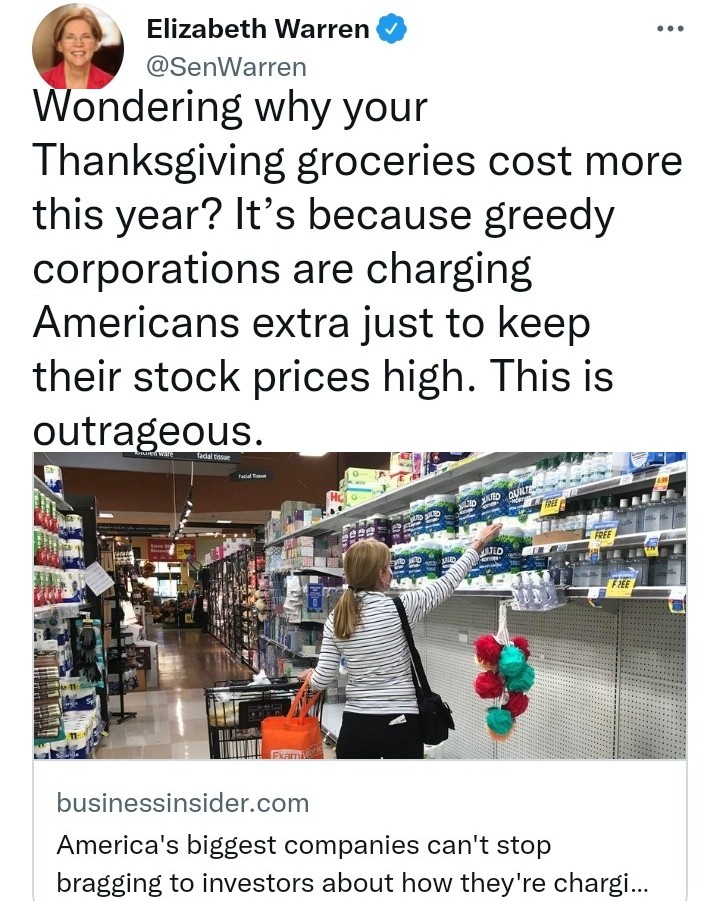Economic glossolalia.
-----
Consumer product companies - the ones that make most of the stuff we buy on a daily basis - are posting strong profits this earnings season, even though labor and supply-chain difficulties are making things more expensive.
Prices for businesses are up more than 8% over the past year, according to the US Bureau of Labor Statistics, adding pressure to their bottom lines.
But strong customer demand is allowing many companies to focus their attention on higher-end products and offer fewer discounts and deals, since shoppers have shown a willingness to buy what is available.
Advertisement
Still, there's an even simpler reason that businesses have been able to take the hit and still keep shareholders happy: They're charging you more.
As companies reported third quarter earnings in recent weeks, several have appeared to brag about their ability to reach into your wallet without scaring you off.
"What we are very good at is pricing," Colgate-Palmolive CEO Noel Wallace said. "Whether it's foreign exchange inflation or raw and packing material inflation, we have found ways over time to recover that in our margin line."
Still, there's an even simpler reason that businesses have been able to take the hit and still keep shareholders happy: They're charging you more.
As companies reported third quarter earnings in recent weeks, several have appeared to brag about their ability to reach into your wallet without scaring you off.
"What we are very good at is pricing," Colgate-Palmolive CEO Noel Wallace said. "Whether it's foreign exchange inflation or raw and packing material inflation, we have found ways over time to recover that in our margin line."
Unilever, which owns a staggering number of household brands, reported that while the number of sales dipped slightly across several of its major segments, it was still able to grow profits by raising prices by roughly 4%-5%.
"Consumer-facing price is the last lever we normally use to manage inflation," Unilever CFO Graeme Pitkethly said before describing how they did it: "We find that taking several small price increases is more effective than one large price jump."
Proctor and Gamble also successfully rolled out a series of price hikes in the quarter that perhaps only the most eagle-eyed shopper would have noticed.
"We have not seen any material reaction from consumers," P&G CFO Andre Schulten said. "So that makes us feel good about our relative position."
Some of the retailers that sell many of those companies' products also weighed in on their buck-passing ability.
"We've been very comfortable with our ability to pass on the increases that we've seen at this point," Kroger CFO Gary Millerchip said. "And we would expect that to continue to be the case."
By contrast, Keurig Dr. Pepper acknowledged raising prices, but said the company had no real choice.
"We're trying to keep prices down," CEO Robert J. Gamgort said. "We're only passing on the coffee costs because they are excessively high."
"We have leaned on productivity because it's available to us much more than pricing because it's the right thing to do for the ecosystem of Keurig," he added. "I recognize that concept is very different concept than traditional CPG."
A key reason companies are able to succeed with these hikes is that so many of them are doing it. If only Unilever charged more, that could drive shoppers to choose an offering from Colgate-Palmolive or P&G.
When all of them do it, you don't have a choice.
So far, federal economic aid has helped offset the impact of these new costs on American households, but most of those programs ended over the summer.
The next few months are likely to bring even more price increases, the companies said, which means even more nickels and dimes on paper towels and toothpaste.
--
https://www.businessinsider.in/retail/news/americas-biggest-companies-cant-stop-bragging-to-investors-about-how-theyre-charging-you-more/articleshow/87493471.cms



